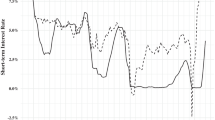Abstract
The world economy today is swept by unprecedented rates of change, complexity, interconnectedness, and uncertainty. For the first time since the 1930s, issues of the international economy and financial markets are playing a pivotal role in discussions of foreign and domestic policy. However, even as the revolutionary trends in the international economy and in world finance are in the offing, it is important to realize that the problems of mankind are primarily economic and social, not financial or political. While the trends towards liberalization of economic policies and integration of financial markets might seem to point toward the ultimate triumph of the ‘magic of the market and free enterprise,’ a little reflection will reveal a number of undercurrents, dilemmas, and difficult choices waiting to be resolved. This article identifies the structural and human dimensions of these challenges in the form of thirteen Policy Imperatives aimed at the creation of modified versions of financial markets to make them more humane and less vulnerable to failure.
Similar content being viewed by others
References
Perrow, Charles (1984). Normal Accidents. New York: Basic Books.
Glassman, Robert (1973). ‘Persistence and loose coupling.’ Behavioral Science 18 (March), 83–98.
Committee for the Study of Economic and Monetary Union, Commission of the European Communities (1989). Report on Economic and Monetary Union in the European Community (April 12).
Pöhl, Karl Otto (1990). Basic Features of a European Monetary Order. Lecture presented on January 16, 1990, in Paris.
Ashby, Ross W. (1956). An Introduction to Cybernetics. New York: John Wiley.
Hannan, Michael and John Freeman (1977). ‘The population ecology of organizations.’ American Journal of Sociology 82 (March), 929–964.
Ogato, S., Richard N. Cooper, and Horst Schulmann (1989). International Financial Integration: The Policy Challenges. New York: The Trilateral Commission.
The Economist (1991). ‘International finance survey: gamblers, masters and slaves.’ 27 (April), pp. 5–6.
Rothchild, John (1988). A Fool and His Money. New York: Viking, p. 198.
As quoted in: Fingleton, Eamonn (1991). ‘Highly speculative.’ The Atlantic 267 (June), 22–25.
Robinson, W. S. (1950). ‘Ecological correlations and the behavior of individuals.’ American Sociological Review 15 (August), 351–357.
Rousseau, D. M. (1985). ‘Issues of level in organizational research: multi-level and cross-level perspectives.’ In L. L. Cummings and Barry M. Staw (eds.), Research in Organizational Behavior 7, pp. 1–37, Greenwich, CT: JAI Press.
Lux, Kenneth (1990). Adam Smith's Mistake: How a Moral Philosopher Invented Economics and Ended Morality. Boston: Shambhala.
Halal, William E. and Alexander I. Nikitin (1990). ‘One world: the coming synthesis of a new capitalism and a new socialism.’ The Futurist (November-December), 8–15.
Halal, William E. and Alexander I. Nikitin (1990). ‘One world: the coming synthesis of a new capitalism and a new socialism.’ The Futurist (November-December) Ibid., p. 10.
The Gospel according to St. Matthew proclaims: ‘For unto everyone that hath shall be given, and he shall have abundance; but from him that hath not shall be taken away even that which he hath’ (Gospel of St. Matthew, 25: 29).
Merton, Robert (1968). ‘The Matthew effect in science.’ Science 159 (January), 56–63.
Merton, Robert (1973). The Sociology of Science. Chicago: University of Chicago Press.
Greenwood, John and Ogus, Simon. As summarized in The Economist (1992): Asian Economies: Freedom Pays.
Author information
Authors and Affiliations
Rights and permissions
About this article
Cite this article
Korukonda, A.R. Policy Imperatives for the International Economy and for Financial Markets in the Emerging World Order. International Journal of Value-Based Management 12, 51–67 (1999). https://doi.org/10.1023/A:1007763516151
Issue Date:
DOI: https://doi.org/10.1023/A:1007763516151




